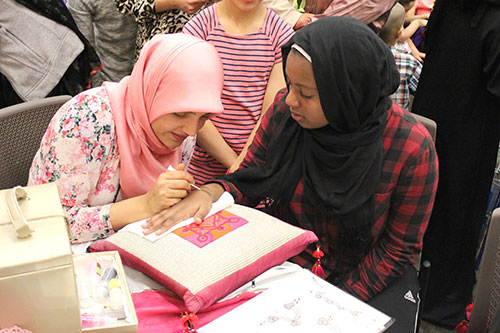About 400 people gathered in the Redwood Room at Central Park Library on April 1 to celebrate Arabic Day. The Hennaist used henna (a dye used for body art) to paint intricate flowers onto people’s arms and hands. Lubna Shaikh wrote names in Arabic calligraphy. Parents had their cameras ready for the children’s performances and traditional clothing fashion show from various Arabic regions. The event was organized by four industrious girls in Girl Scout Troop 60053: Salma Mostafa, Yumna Battisha, Malak Ashmawi and Amana Kaddoura. Mostafa attends Cupertino’s Hyde Middle School while Battisha, Ashmawi and Kaddoura attend Santa Clara’s Granada Islamic School.
One of the causes for celebration is the addition of an Arabic book collection to Central Park Library’s children’s section, a project spearheaded by these Girl Scouts. Books about animals, the Magic School Bus and fairytales were among the books donated.
“Our Girl Scout troop has a Silver Award that we want to earn and we were looking to do something that the community lacks,” Mostafa said. “As children we were always looking for books written in Arabic but we couldn’t find any. We wanted Arabic books to be accessible to the community. A lot of people in the Arabic community had books and we sent out emails and chatted with a bunch of people and asked for children’s books in Arabic. We received about 150 book donations which we gave to the Santa Clara City Library. We’ve been donating these books since November but today is our opening day of the Arabic book collection.”
Ashmawi shared some details of planning for Arabic Day, made possible by generous sponsors.
“We found a professional henna artist for today and she made the henna cones which apply the henna,” she said. “The food was all donated to us by many local restaurants (Sultan Bakery, Halal Market, Via Mia Pizza, Kabab & Curry’s, Dish Dash, Holy Land and Oasis Baklava). [The food here includes] falafel, hummus and baklava. We are showing the art of three artists. [The calligrapher] shows that the Arabic language is based on beautiful writing.”
Emceeing the fashion show was Kaddoura, who introduced the traditional clothing from Palestine, Egypt, Morocco, Libya, Algeria, Yemen and Saudi Arabia.
“What defines the clothing from these countries are the differences between the traditional garb,” Kaddoura said. “With what I’m wearing, the cross stitching design is native to Palestine, Lebanon, Jordan and Syria. And although Egypt is close by, the style there is different. What I’ve noticed about my friends from Egypt is that they don’t have cross-stitching in the clothes from their culture.”
“For Arab people whose parents come from an Arab country, they should know that some of the words we use here in America come from Arabic words,” said Battisha, who referred to Arabic as a “very eloquent language.”
According to Battisha, such words include alphabet (alif-ba-taa), gazelle (ghazal), cotton (qutn), coffee (qahwah) and lemon (laymoon).
“Today’s event is about celebrating Arabic culture and educating the community about this population,” said Erin Ulrich, the library’s program coordinator of youth services. “It’s a great opportunity for people to learn about a culture they might not know much about.”
